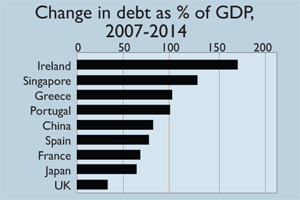The world is still drowning in debt
Almost eight years after the credit crunch began, the world’s debt pile is higher than ever – but don't count on us making much of a dent in it.

Get the latest financial news, insights and expert analysis from our award-winning MoneyWeek team, to help you understand what really matters when it comes to your finances.
You are now subscribed
Your newsletter sign-up was successful
Want to add more newsletters?

Twice daily
MoneyWeek
Get the latest financial news, insights and expert analysis from our award-winning MoneyWeek team, to help you understand what really matters when it comes to your finances.

Four times a week
Look After My Bills
Sign up to our free money-saving newsletter, filled with the latest news and expert advice to help you find the best tips and deals for managing your bills. Start saving today!
You might think that the global economy would have worked off some debt a few years after a debt crisis. But you'd be wrong. Almost eight years after the credit crunch began, the world's debt pile is higher than ever and odds are we won't make much of a dent in it over the next few years. High debt levels undermine growth and make households and governments more vulnerable to financial crises. So little has changed since 2007.
Between the end of 2007 and July 2014, the world added $57trn to its borrowings, according to McKinsey Global Institute. The consultancy has totted up public, household, financial sector, and corporate debt (for companies outside the financial sector). Overall, debt is now $199trn, or 286% of global GDP. That's up from 269% in 2007.
"Some of the growth in global debt is benign or even desirable," says McKinsey. For example, developing economies accounted for almost half the increase. This is partly a reflection of financial markets evolving and more households and firms gaining access to credit. If you strip out the borrowings of banks and other financial institutions, then overall emerging-market debt comes to 121% of GDP "relatively modest" compared to the 280% seen in advanced economies. Malaysia, Thailand and China are notable exceptions.
MoneyWeek
Subscribe to MoneyWeek today and get your first six magazine issues absolutely FREE

Sign up to Money Morning
Don't miss the latest investment and personal finances news, market analysis, plus money-saving tips with our free twice-daily newsletter
Don't miss the latest investment and personal finances news, market analysis, plus money-saving tips with our free twice-daily newsletter
Where the debt is piling up

The scant progress is partly due to many households continuing to borrow and spend. In America and Ireland, household borrowing rose by more than a third in the run-up to the crisis. Since then, consumers in both states have cut back, as have those in the UK and Spain. But in France, South Korea, Sweden and Australia, the debt-to-income ratio has climbed by 10%-19% since 2007. In Canada it is 22% higher. Denmark has the highest debt-to-income ratio, at 269%. This is largely down to rising mortgage debt, as rising house prices encourage borrowing and spending.
Who's vulnerable?
The key to reducing debt of all kinds is economic growth, but this is getting harder and harder to come by. Workforces are shrinking in most developed countries. Everyone is trying to cut back at the same time, so it's hard to secure an advantage by weakening your currency to boost exports. Global growth is soggy, so inflation, which erodes the real value of debt, is low. And how will fragile, debt-soaked Western economies cope with higher interest rates or a new financial crisis? It's clear that we are still firmly in the grip of the post-bubble hangover.
Get the latest financial news, insights and expert analysis from our award-winning MoneyWeek team, to help you understand what really matters when it comes to your finances.

-
 Average UK house price reaches £300,000 for first time, Halifax says
Average UK house price reaches £300,000 for first time, Halifax saysWhile the average house price has topped £300k, regional disparities still remain, Halifax finds.
-
 Barings Emerging Europe trust bounces back from Russia woes
Barings Emerging Europe trust bounces back from Russia woesBarings Emerging Europe trust has added the Middle East and Africa to its mandate, delivering a strong recovery, says Max King